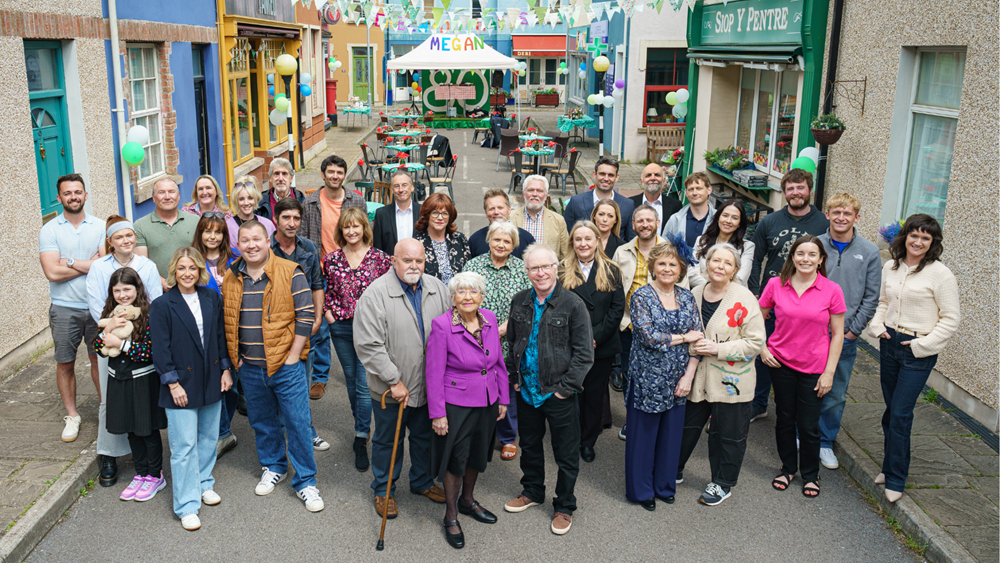Pobol y Cwm: BBC’s longest running TV soap celebrates 50 years on air

Photo: BBC Cymru
16 October 2024
Writing in The Conversation, Professor Jamie Medhurst from the Department of Theatre, Film & Television Studies looks back at half a century of the BBC Wales soap opera:
“We had a special kind of audience in mind: the Welsh who have never read Barn or Y Faner (two popular Welsh-language publications written in a scholarly tone) but live their lives every day in the natural sound of the Welsh language.” That’s how dramatist Gwenlyn Parry described the target audience of the new BBC Wales soap opera, Pobol y Cwm, which was broadcast for the first time 50 years ago, on October 16 1974.
Pobol y Cwm – which means “people of the valley” – is set in the fictional village of Cwmderi, in the Gwendraeth valley, south-west Wales. It was originally filmed at Broadway Studios in Cardiff, then on a purpose-built lot at BBC Broadcasting House, also in the Welsh capital. But since 2011, the programme has been mainly filmed at the BBC’s drama studios at Roath Lock in Cardiff Bay.
BBC Wales’ television service had been in existence for ten years by the time the series was broadcast. Television producer John Hefin felt there was a need for a long drama series in Welsh, which would meet the needs of audiences in the same way as Coronation Street had been doing on ITV since 1960.
Hefin and Parry’s vision was evident. In planning meetings for the series, it was noted that “the main aim of the series is pure entertainment and from a mathematical analysis it will require 70% easy, humorous lightness, and 30% personal and social problems”.
Other guidelines for the series were clear from the start – no preaching about the state of the Welsh language, the evils of drugs, the dangers of sex, or theological dogma. The main aim was to “develop a story line full of seemingly insignificant events but conveying a believable whole of Welsh village life”.
Soap history
Soap operas can be traced back to the early days of US radio, when drama series were sponsored by washing powder manufacturers, hence the word “soap”. The BBC launched drama series, or soap operas, on the radio after the end of the second world war. Examples include Mrs Dale’s Diary in 1948 and, of course, The Archers in 1951.
But audiences had to wait until 1954 until the first soap opera was launched on the BBC’s television service, The Grove Family. But the life of this series was short-lived, ending in 1957.
In December 1960, ITV Granada launched Coronation Street, a series about everyday street life in the Manchester area. It soon became extremely popular among viewers across Britain. The appeal of the series was in its simplicity. It focused on the normal lives of working class people. The plot was derived from the setting and personalities, especially the strong female characters.
Tony Warren was the man who sold the idea of Coronation Street to the Granada company. He realised, at the end of the 1950s, that the way of life in that part of England was changing. Warren wanted to capture and preserve traditional spirit and show it to the rest of the country.
I wonder, then, when proposing an idea for a soap opera to the BBC at the beginning of the 1970s, whether Hefin and Parry had the same feeling. The Wales of the time was changing, after all. The 1971 census showed that the Welsh language was under siege.
It was felt by many within the BBC that a series reflecting old Welsh values was needed. And yet it also needed to be contemporary, with an element of realism. This is the trick for successful soap opera producers – the series must be “real” enough so that people can believe in the characters, and can identify with them in times of joy and sadness.
Pobol y Cwm was a success from the outset, and that continued throughout the 1970s and 1980s. When musician John Lennon died in December 1980, a film about the Beatles was broadcast on BBC Wales as a tribute instead of Pobol y Cwm. It resulted in hundreds of loyal soap opera viewers flooding the switchboard of Broadcasting House in Cardiff with complaints.
The BBC also received complaints that there were too many scenes taking place in the pub because this was not a “Welsh” thing to do. And yet, according to Parry, there were no complaints when a scene was shown with one of the main characters, Reg Harries, having an affair with the schoolmaster’s wife in the early 1980s.
Famous faces
Pobol y Cwm has nurtured the talent of several actors who have become more widely known. Among them Ioan Gruffudd, Iwan Rheon and Alexandra Roach. And several other celebrities have made cameo appearances in the series over the years, including actor Michael Sheen, presenter Michael Aspel and wrestler Giant Haystacks.
In an article in the Welsh newspaper Y Cymro in 1975, Parry said: “The aim was to produce stuff that a natural Welsh person would watch, not because it was in Welsh, but because it was entertaining. The kind of stuff that will be needed to draw viewers to the fourth channel when it comes.”
Still produced by BBC Wales, the series moved to Wales’ new fourth channel, S4C, in 1982 and the viewers followed. It remains among the channel’s most popular programmes.
This article is republished from The Conversation under a Creative Commons license. Read the original article.
